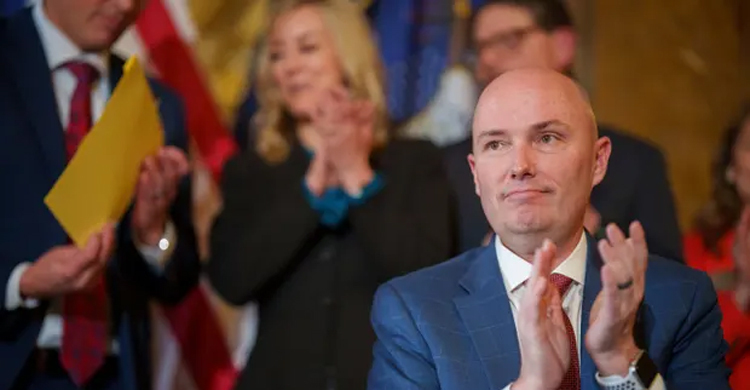Utah bans under-18s from using social media unless parents consent

The governor of Utah, Spencer Cox, has signed sweeping social media legislation requiring explicit parental permissions for anyone under 18 to use platforms such as TikTok, Instagram and Facebook. He also signed a bill prohibiting social media companies from employing techniques that could cause minors to develop an “addiction” to the platforms.
The former is the first state law in the US prohibiting social media services from allowing access to minors without parental consent. The state’s Republican-controlled legislature passed both bills earlier this month, despite opposition from civil liberties groups.
“We’re no longer willing to let social media companies continue to harm the mental health of our youth,” Cox, a Republican, said in a message on Twitter.
The impact of social media on children has become a topic of growing debate among lawmakers at the state and federal levels. On the same day Cox signed the bills in Utah, TikTok’s CEO testified before Congress to address concerns about national security, data privacy and teen users’ mental health.
The new law prohibiting minors from accessing social media without their parents’ consent would also allow parents or guardians to access all of their children’s posts. The platforms will be required to block users younger than 18 from accessing accounts between 10.30pm and 6.30am unless parents modify the settings.
The laws also prohibit social media companies from advertising to minors, collecting information about them or targeting content to them.
What’s not clear from the Utah laws and others is how the states plan to enforce the new regulations. Companies are already prohibited from collecting data on children younger than 13 without parental consent under the federal Children’s Online Privacy Protection Act. For this reason, social media companies already ban kids under 13 from signing up to their platforms – but children can easily get around it, both with and without their parents’ permission.
Civil liberties groups have raised concerns that such provisions will block marginalized youth including LGBTQ+ teens from accessing online support networks and information.
Tech groups have also opposed the laws. “Utah will soon require online services to collect sensitive information about teens and families, not only to verify ages, but to verify parental relationships, like government-issued IDs and birth certificates, putting their private data at risk of breach,” said Nicole Saad Bembridge, an associate director at NetChoice, a tech lobby group. “These laws also infringe on Utahans’ first amendment rights to share and access speech online – an effort already rejected by the supreme court in 1997.”
The law will take effect next March. Michael McKell, the Republican state senator who sponsored the bill, told the New York Times that social media is “a contributing factor” to poor teen mental health, and that the laws were intended to address that issue.
Several states have sought to enact guardrails for young social media users. Lawmakers in Connecticut and Ohio have put forward measures to require parental permissions for users younger than 16. Lawmakers in Arkansas and Texas have also introduced bills to restrict social media use among minors under 18, with the latter aiming to ban social media accounts for minors entirely.
California enacted a measure requiring social media networks to enact the highest privacy settings for users younger than 18 as a default.
Source: The Guardian



